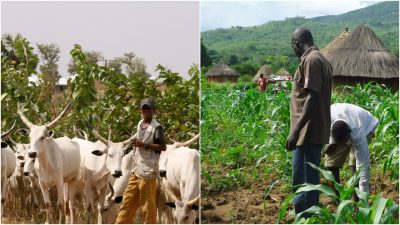Communities Identify Dialogue as a Strategic Solution to Farmer/Herders Crisis

herdsmen & farmers
Erdoo Due/Raphael Mbaiorga
Communities across Guma, Otukpo and Obi Local Government Areas (LGAs) have identified the use of dialogue as a key strategy for transforming crises involving farmers and herders in Nigeria. They also identified dialogue mechanisms as viable and appropriate tools for engaging stakeholders in the search for credible and effective solutions to conflicts. This declaration by the stakeholders came after a period of sustained implementation by Search for Common Ground (Search) of the Transforming Farmers and Herders Conflict and Freedom of Religious Belief project, also (popularly) known among stakeholders as the Peace Architecture Dialogue (PAD) project.
Search in 2018 established the State Peace Architecture Dialogue (PAD) Forum in Benue State as part of their ongoing project, which seeks to transform the farmer-herder conflict and promote religious freedom in the Middle Belt region of Nigeria. The direct targeted States for the project include Benue, Nasarawa and Plateau. In Benue State alone no less than 15 communities across selected LGAs have benefited from this project. In addition, the project has regularly engaged 40 or more organisations and government agencies drawn from state level and national organisations. So far, Search has collaborated to convene 12 state level Peace Architecture Dialogue (PAD) meetings to address priority conflict issues in the State.
Between June and July (2020) Search sponsored no less than 6 dialogue sessions that brought together stakeholders drawn from 15 communities namely: Yandev, Udaaya, Balkin Kwalta, Gbajimba, Yelewata, Mbadwen, Iordyen, Nyiev, Nzorov, Kaambe, Uvir and Mbabai, all of Guma LGA. Community stakeholders from Itakpa, Akpa and the Burnt bricks communities of Otukpo as well as Otobi community of Obi local Government Area also participated in the various dialogue sessions that aimed to seek ways to address farmer-herder issues in the LGAs. State level stakeholders that played key roles in the dialogue comprised representatives of the Nigerian Police Force, Nigerian Security and Civil Defence Corps (NSCDC), Benue state Ministry of Agriculture, Department of State Security (DSS), the Vigilante, MACBAN, AFAN, and other selected stakeholders from civil society.
While the aim of the dialogue meeting was to transform the farmers and herders conflict in violence-prone communities, the sessions also afforded opportunities for the stakeholders to deepen their knowledge and understanding of the Open Grazing Prohibition and Ranches Establishment Law 2017 and to improve their understanding of the emerging issues and dynamics of the farmers and herders conflicts in Guma, Otupko and other LGAs in the State.
Stakeholders at the dialogue meetings identified a long list of the factors driving the farmer-herder crisis in the State. These included: disagreements between herders and farmers over land ownership and over access to use of land; lack of willingness to forgive past grievances; drug abuse by youths, unemployment among youths and youth restiveness; criminality involving cattle rustling and sexual crimes against women and girls; practices associated with impoundment of cattle and the challenges created in the way of herders who tried to recover their impounded cattle were also identified.
Other factors involved the belief among Fulani herdsmen that the Open Grazing Prohibition and Ranches Establishment Law was designed as a weapon against the herders. Still other factors were said to include the proliferation of arms, the presence of trained armed militia, extortionist practices among some members of Livestock Guards, use of under-aged children to herding activities, lack of land for grazing, lawlessness on the part of some herders who go beyond the mutual understanding between traditional rulers and herders, changes in traditional methods of cattle rearing and the attraction to modern life among some members of the herding community, poverty and general unemployment, attacks and killing of farmers on their farm lands, stigmatization of the Fulani ethnic group, conspiracy theories around farmer-herder relations, and a host of other identified factors.
Stakeholders at the various dialogue sessions expressed their commitment to ending the lingering farmer-herder conflicts. Hence, their commitment to deepen their collaboration with Government and other stakeholders and work to reconcile the conflicting parties, settle their differences and find lasting solutions to the root causes of the conflict. The stakeholders also encouraged that the dialogue mechanisms should be sustained to enable ongoing conflict transformation processes. It was observed that wherever there is a functional dialogue platform where parties can be brought together; there is the likelihood of finding a solution to every conflict, even if it had become protracted over a long period of time.
Recall that the conflict in Benue State involving farmers and herders has lingered for long time now dating from about 2011, which necessitated the enactment by Benue State Government of the Open Grazing Prohibition and Ranches Establishment Law in 2017.
Facilitators during the dialogue sessions were members of the State Steering Committee of PAD jointly chaired by the Benue State Planning Commission and Office of the Special Adviser to the Executive Governor on SDGs/NEPAD. The facilitation team was led by Search State Project Manager Mrs. Gift Omoniwa with the following as members: Dr. Helen Teghtegh, PAD Secretary; Joseph Mtemdoo Gbagyo, Esq, PAD Legal Advisor. Other members were peace-building experts such as Executive Facilitator of Civil Organizations Research Advocacy and Funding Initiatives Development (CORAFID), Mr. Nathaniel M. Awuapila, and Dr. Victoria Daaor.




Good publication.
This is great Job by Search and all the stakeholders in Benue state for pushing this process forward…Dialogue is the sure way for effective engagement on farmer herder conflict.